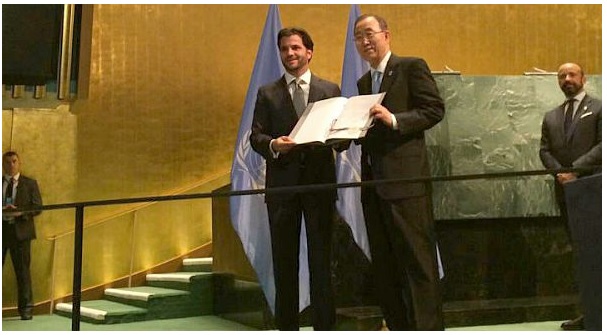The Natural Resources Defense Council works to safeguard the earth – its people, its plants and animals, and the natural systems on which all life depends; and the NRDC Director for Latin America, Amanda Maxwell, published a document on Wednesday September 21, stating that Mexico is making an important commitment, delivering ratified Paris agreement to the UN, in order to combat global climate change with domestic action.
Mexico’s Environment Secretary, Rafael Pacchiano Alamán, delivered the country’s ratification of the Paris Agreement to the United Nations today, bringing Mexico into the fold of the now- 60 countries who have ratified this groundbreaking treaty to combat global climate change with domestic action. Those 60 countries account for 47.76% of emissions worldwide.

By ratifying the Paris Agreement, Mexico’s government has officially committed to meet the ambitious climate goals it proposed last March ahead of the December 2015 Conference of Parties (COP) in Paris. (Photo: Gobierno de Mexico)
In fact, Mexico is the latest of many Latin American countries that have taken this important step, with others on the way. Here are the countries’ positions to date:*
- Countries that have ratified: Argentina, Belize, Brazil, Guyana, Honduras, Mexico, Panama and Peru
- Countries that have announced their intentions to ratify in 2016: Chile, Costa Rica, Ecuador, Guatemala and Paraguay
- Countries that have not announced:Bolivia, Colombia, El Salvador, Nicaragua, Suriname, Uruguay and Venezuela
Latin American countries are among the world’s hardest hit by climate change impacts. Melting glaciers, increased flooding and droughts, devastated coral reefs, and decreased agricultural yields are just some of the ways in which people and the environment are already suffering in the region.
These impacts have a significant financial burden, too: experts have estimated that economic losses caused by global warming could amount to$100 billion annually by 2050 in Latin America and the Caribbean. It’s no wonder, then, that61% of the region’s citizens believe that climate change is the most serious threat facing the planet.
That’s also why—just like in the lead-up to the Paris negotiations that resulted in the treaty—Latin America is proving to be a leading region on climate solutions. My colleague, Carolina Herrera, has described some of the actions different countries are taking here.
So what does this mean for Mexico? By ratifying the agreement, Mexico’s government officially has committed to meet the climate goals it proposed last March ahead of the December 2015 COP in Paris. Effectively, the “intended nationally determined contribution” (or INDC) that the government had presented is no longer “intended,” but is rather now a formal goal, and the country (like all others who ratify the Paris Agreement) needs to meet it.
Click here to se what this means to Mexico.
Source: https://www.nrdc.org/



